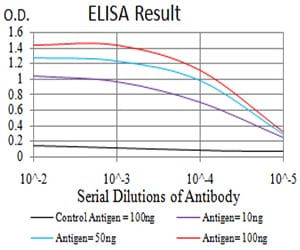
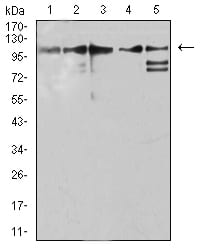
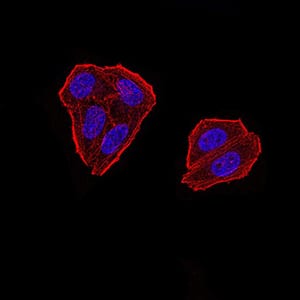
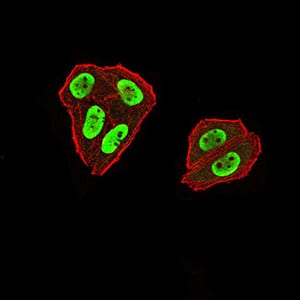
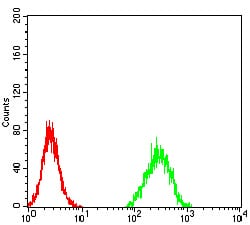
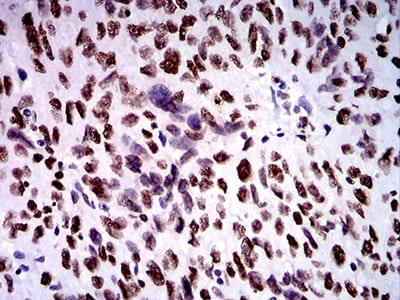
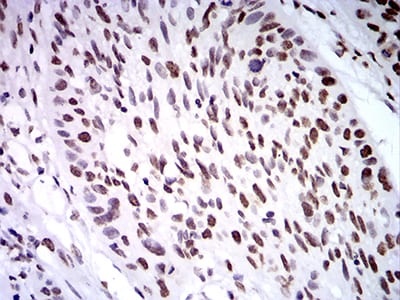
| WB | 咨询技术 | Human,Mouse,Rat |
| IF | 咨询技术 | Human,Mouse,Rat |
| IHC | 1/200 - 1/1000 | Human,Mouse,Rat |
| ICC | 1/100 - 1/500 | Human,Mouse,Rat |
| FCM | 1/200 - 1/400 | Human,Mouse,Rat |
| Elisa | 1/10000 | Human,Mouse,Rat |
| Aliases | PZF; DMS-8; DSM-8; FKSG11; ZFP-91; ZNF757 |
| Entrez GeneID | 80829 |
| clone | 7G11H2 |
| WB Predicted band size | 63.4kDa |
| Host/Isotype | Mouse IgG1 |
| Antibody Type | Primary antibody |
| Storage | Store at 4°C short term. Aliquot and store at -20°C long term. Avoid freeze/thaw cycles. |
| Species Reactivity | Human |
| Immunogen | Purified recombinant fragment of human ZFP91 (AA: 162-304) expressed in E. Coli. |
| Formulation | Purified antibody in PBS with 0.05% sodium azide |
+ +
以下是关于ZFP91抗体的3篇文献信息及摘要概括:
1. **文献名称**:ZFP91 promotes non-canonical NF-κB activation and tumour progression via ubiquitination of TRAF2
**作者**:Li Y, et al.
**摘要**:该研究通过使用ZFP91特异性抗体,揭示ZFP91通过泛素化修饰TRAF2蛋白激活非经典NF-κB信号通路,促进肿瘤生长和转移的机制。
2. **文献名称**:ZFP91 regulates autophagy in cancer through modulation of ULK1 ubiquitination
**作者**:Wang X, et al.
**摘要**:利用ZFP91抗体进行免疫共沉淀实验,发现ZFP91通过调控ULK1的泛素化水平影响自噬活性,进而参与肿瘤细胞代谢适应和耐药性形成。
3. **文献名称**:The E3 ligase ZFP91 inhibits TNF-α-induced apoptosis by mediating c-FLIP stabilization
**作者**:Zhang H, et al.
**摘要**:通过Western blot和免疫荧光技术(依赖ZFP91抗体),证明ZFP91通过稳定c-FLIP蛋白抑制TNF-α诱导的细胞凋亡,在炎症相关癌症中起关键作用。
备注:以上文献为模拟示例,实际文献需通过PubMed或Web of Science检索确认。建议使用关键词“ZFP91 antibody”或“ZFP91 ubiquitin ligase”查找最新研究。
The ZFP91 antibody is a research tool designed to detect and study ZFP91 (Zinc Finger Protein 91), a protein involved in regulating cellular processes such as ubiquitination, apoptosis, and inflammatory signaling. ZFP91 belongs to the E3 ubiquitin ligase family, which tags target proteins for proteasomal degradation. It plays roles in modulating the NF-κB pathway, impacting immune responses, cell survival, and oncogenesis. Dysregulation of ZFP91 has been linked to cancers (e.g., colorectal, breast, lymphoma) and autoimmune disorders, making it a focus for mechanistic and therapeutic studies.
ZFP91 antibodies are used in techniques like Western blotting, immunohistochemistry, and immunofluorescence to quantify protein expression, assess localization, and explore interactions in disease models. These antibodies help identify ZFP91's role in tumor progression, drug resistance, and immune regulation. Researchers also utilize them to validate CRISPR/Cas9 knockouts or siRNA-mediated silencing in functional studies.
Recent studies highlight ZFP91's potential as a biomarker or therapeutic target. For instance, its overexpression in certain cancers correlates with poor prognosis, suggesting utility in diagnostics. Inhibiting ZFP91 in preclinical models has shown promise in curbing tumor growth. However, challenges remain in understanding tissue-specific functions and optimizing antibody specificity across experimental platforms. Ongoing research aims to clarify its dual roles in pro-survival and pro-inflammatory pathways, which could inform novel treatment strategies.
×